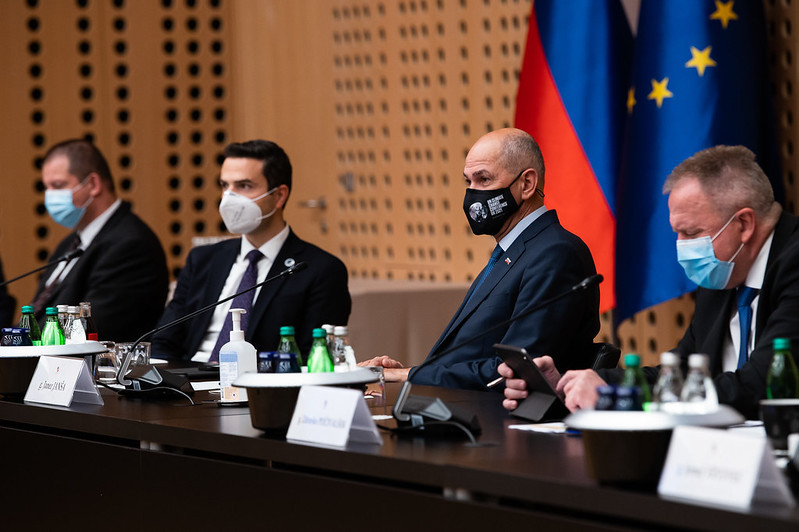By: UKOM
Prime Minister Janez Janša convened a working consultation session entitled “The Slovenian energy sector today, in 2033 and beyond”.
The main reason the consultation was convened was because of the many challenges the energy sector in Slovenia and Europe is facing at present. The energy sector is the backbone of our modern way of life and a pillar of our national security. However, the events of the last few months pose additional challenges. Energy prices (oil, natural gas, coal and electricity) have seen record growth in Europe and on a global scale, and have also risen in Slovenia. As an EU Member State, Slovenia is committed to the shared objectives of the energy transition to a low-carbon society.
Slovenia is also currently on the verge of adopting the Strategy for Phasing out Coal. Meanwhile the issue of the energy permit for the NEK2 nuclear power project means Slovenia is faced with difficult decisions regarding that investment. With a growing number of renewable sources of energy comes the need to set up energy storage facilities. We are facing the challenge of converting excess energy into hydrogen and finding ways to decarbonise transport. The issue of cybersecurity for energy production and distribution systems is also increasingly taking centre stage.
Over the next few years, a range of sources will be available to fund and implement energy projects – funding from the EU Cohesion Policy 2021–2027, national recovery and resilience plan, REACT‑EU and the Just Transition Fund.
The objective of the consultation was to discuss the situation and projections from different perspectives and for the participants to exchange views on the challenges that face Slovenian energy sector. In addition to key stakeholders from the energy sector, the consultation was attended by Ministers Zdravko Počivalšek, Matej Tonin, Jernej Vrtovec, Andrej Šircelj, Zvone Černač, Mark Boris Andrijanič and Andrej Vizjak.
In their addresses, the Prime Minister and ministers emphasised key frameworks and guidelines regarding climate change, decarbonisation of society and the importance of the energy in different sectors. They stressed the connection between cybersecurity and the energy sector, especially cyberattack threats to electricity grids and production capacities. During the discussion, Government representatives emphasised the point that nuclear energy is increasingly recognised as the only option for achieving climate goals. The question was also addressed of whether the high energy and energy prices we have seen recently could trigger a situation similar to that of 2009 and 2010, when the financial and economic crisis suddenly meant that no one in the European institutions was talking about climate change anymore. Therefore, the question arises, whether we will still worry about mitigating the consequences in face of the high energy prices or will we forget about achieving climate goals. It was also emphasised that on the EU level, Europe is energy dependent on other countries. The green transition in the EU also means the transition to strategic autonomy in key areas.
Important actors in the energy sector presented their views on the current situation and underlined their suggestions and solutions in this area for the next decades. The discussion focused on the importance of investment in the energy sector, as well as the importance of innovation and digitisation. The importance of investing in innovation and the challenges posed by renewable energy was also highlighted. Views on the use of nuclear energy were also expressed during the discussion. The purpose of today’s in-depth discussion was not, however, to draw formal conclusions, but rather to exchange different views.

